Lisbon: An emerging global capital of innovation in scaling social solutions
In Lisbon, the month of June brings hotter temperatures, the jubilant festivities of Santos Populares and a community-wide buzz that is impossible to ignore. But this year, there’s another palpable energy that can be felt across the city, the energy propelling Lisbon’s path to becoming a global hub of innovation.
Story and Images by Miles Bullock
What began in City Hall over 10 years ago with early-stage investments in its innovation economy have scaled into a robust, city-wide ecosystem that now supports numerous billion-dollar enterprises. At the core of this concerted effort is Lisbon’s Unicorn Factory. Beginning as Startup Lisboa in 2012, Unicorn Factory was rebranded and launched in 2022 to foster a whole-of-city approach to catalyze its tech sector and put the city on the map as a force for innovation. Since its launch, Unicorn Factory Lisboa has grown to support over 820 startups and a dozen unicorn companies valued at over a billion dollars each, helping Lisbon to become an attractive destination for investors and entrepreneurs.
These strides led to Lisbon being recognized as the European Union’s 2023 European Capital of Innovation, an honor that came with a €1 million reward. Lisbon Mayor Carlos Moedas made a bold choice to further advance the city’s commitment to innovation by directly reinvesting the money to create Innovation for All, Europe’s largest social innovation award.
Innovation: “Not for the Few, but for All”
This year, during Lisbon’s Unicorn Week — which takes place during the first week of June and sponsors more than 60 events across the city — members of Lisbon’s innovation ecosystem gathered to celebrate the momentum driving the sector forward, as well as explore ways to expand positive impact to improve the lives of residents.
At Lisbon’s City Hall in Baixa Chiado, a showcase of finalists for the Innovation for All prize energetically kicked off the week. After receiving over 300 applications from 40 countries, nine finalists were selected from across three issue areas, and three winners: Growappy (Quality Education), Equivalence (Immigrant Integration) and Usawa Care (Healthcare) were each awarded €120,000 to continue scaling their work.
While it’s often easy to confuse technology with innovation, an important distinction can also be made between innovation for profit’s sake and innovation for the greater good. In the latter case, it becomes a powerful instrument for collaborative problem solving aimed at serving all members of society, a point which was highlighted during the award ceremony by Deputy Mayor for Economy and Innovation Diogo Moura where he shared that, “Lisbon Innovation for All is not just a prize, it’s a manifesto. A signal that the city believes in talent and impact. That we are building a Lisbon where innovation is designed with people in mind. Not for the few, but for all.”
From within Lisbon’s City Hall, this thinking is becoming embedded into Lisbon’s entrepreneurial DNA, leveraging technology to become globally competitive, attracting bright minds while keeping a focus on social outcomes at the heart. “We are not just creating infrastructure or policy. We are cultivating a culture … Because that’s how we view the future, not by predicting it, but by co-creating it.” shared Moura.
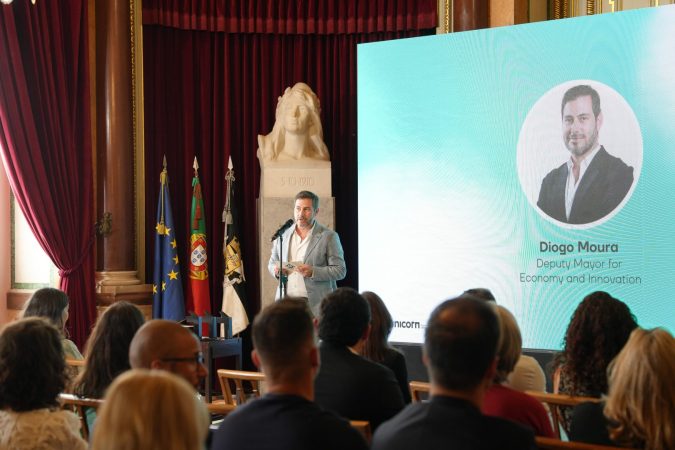
Caption: Lisbon’s Deputy Mayor for Economy and Innovation Diogo Moura speaks to attendees at the Innovation for All award ceremony at Lisbon City Hall during the opening day of Unicorn Week.
Empowering the Next Generation through EdTech
This innovative approach seeks to address challenges with long-term, people-centered solutions, and nowhere is this more visible than in the upstream investments in early education.
One key actor in this space is UBBU, a Portuguese EdTech platform and Innovation for All finalist, that supports teachers and students through interactive games designed to boost core skills using coding.
In identifying the challenges faced by educators, as well as the skills young students need for the future, they developed a scalable platform already proving it can improve student outcomes, demonstrating a 17% increase in math scores.
“We also met the teachers and understood that if we wanted to build something that scaled, it needed to be for the everyday teacher.” said João Barata, Director of Operations at UBBU. “Kids that are starting school today most likely will be working in jobs that don’t exist … the technology is evolving as we speak.” explained Barata.
Through digital literacy, UBBU links core competencies of STEAM (Science, Technology, Engineering, Arts and Mathematics) to global challenges like the United Nations’ Sustainable Development Goals, giving kids the opportunity to formulate solutions to real problems.
Since launching, UBBU now operates in 20 countries and continues to evolve their model to best suit the needs of local educators.
“Essentially, the idea is that children become creators and not only consumers of technology,” says Francisca Crespo, Director of Product and Design, UBBU
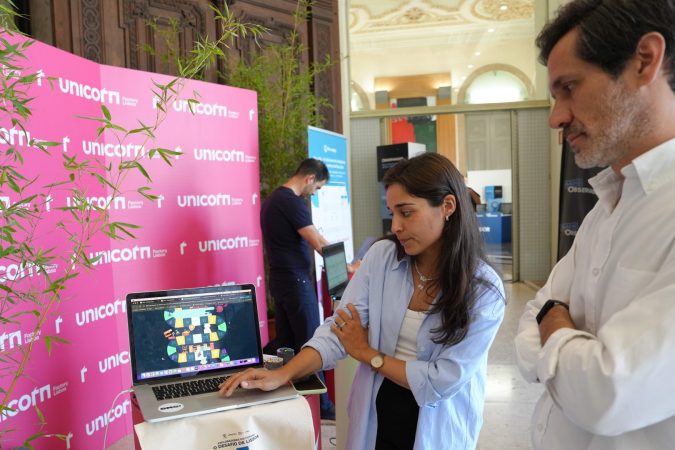
Caption: Members of the UBBU team Francisca Crespo and João Barata demo one of their interactive games at the Innovation for All finalists showcase. This particular game is designed specifically for students in Lisbon to learn about their community while also gaining skills in computer science.
A Vision for a Green, Sustainable Future
The city’s goals for a sustainable future also naturally extend to its green sector. In 2020, Lisbon was named Europe’s Green Capital, demonstrating that economic growth and sustainability can go hand in hand. During the same year, the city committed to being carbon neutral by 2030 — going a step further to challenge the public and private sector to sign the Lisbon 2030 Climate Action Commitment. Powered by the Lisbon Sustainable Enterprises Platform (LSEP), the city is helping companies and organizations commit to adopting measures that contribute to achieving the wider sustainability goals of ESG (Environmental, Social and Governance) set by the city, with over 360 committed already. They’re not alone in this mission either. Partnering with the EU’s Let’s Go Circular initiative, they’re helping transition Lisbon into a capital that reduces waste and creates sustainable practices that the private and public sector can follow.
According to Circle Economy, only 6.9% of the 106 billion tons of materials used annually by the global economy came from recycled sources — a 2.2 percentage point drop since 2015. While sobering, this circularity metric is key to understanding and measuring the progress made by nations and communities around the world. In Portugal, where the nation still lags behind other EU countries, Lisbon is tackling the challenge head on and refining its indicators and supports for companies.
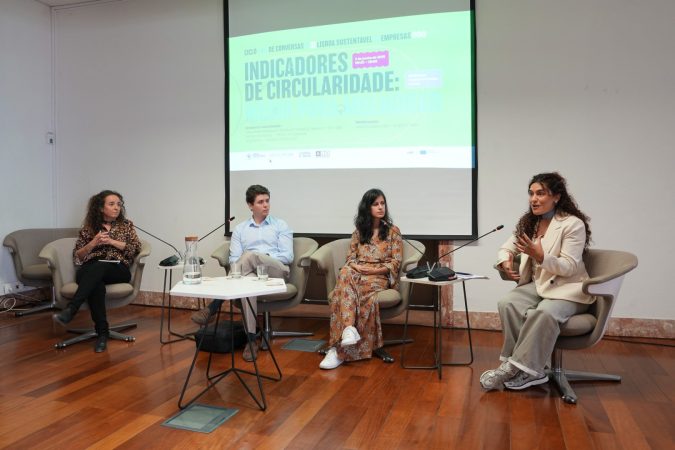
Caption: A panel organized by the Lisbon Sustainable Enterprises Platform at Biblioteca Palácio Galveias discusses key indicators to measure and improve Lisbon’s circular economy performance. From left to right: Ana Penha, Technical Specialist, ADENE, eCircular; Alexandre Rodrigues da Silva, Ph.D. Candidate and Researcher, Universidade Nova de Lisboa (FCT-UNL); Mária Pombo, Project Manager, DECO; Verónica Bleacher (moderator), Project Manager, Impact Hub.
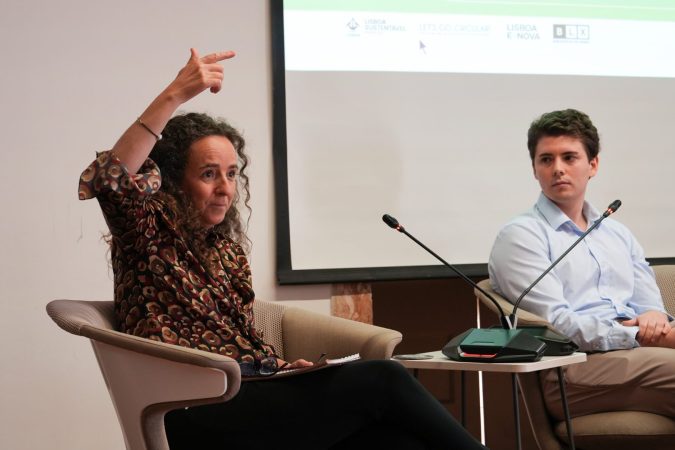
Caption: Ana Penha, Technical Specialist at ADENE, eCircular speaks alongside Alexandre Rodrigues da Silva, Ph.D. Candidate and Researcher, Universidade Nova de Lisboa (FCT-UNL) during a panel discussion organized by the Lisbon Sustainable Enterprises Platform at Palácio Biblioteca.
During a panel hosted by LSEP entitled, “Indicators of Circularity – Measuring for Improvement,” Ana Penha, Technical Specialist at ADENE, eCircular shared that more deeply connecting consumption and operational costs to environmental impact can be a key lever for improving circularity rates. “I think the hardest thing to change is people’s mindsets,” she said. “And so it was very important in this whole economic model to be able to internalize environmental costs.”
Fellow panelist Alexandre Rodrigues da Silva, Ph.D. Candidate and Researcher at the Universidade Nova de Lisboa (FCT-UNL) added that disseminating clear standards for circularity made available for the private sector can further drive adoption. “This means that there is a set of strategic standards that all companies can take advantage of and then break down according to their own implications and sectoral characteristics … so there is still a lot of innovation ahead,” he said. “Naturally, it depends on the sector.”
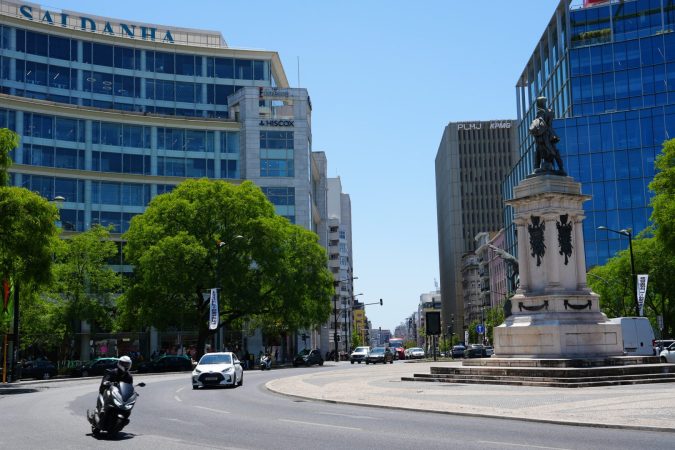
Caption: Saldanha, a bustling hub in the center of Lisbon, is home to the Saldanha Innovation District where the Unicorn Factory’s Greenhub and Gamehub are located.
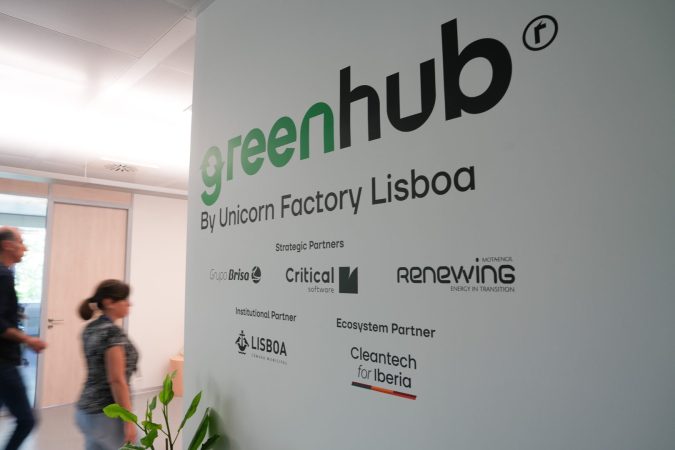
Caption: The Greenhub is a center for green technology solutions and entrepreneurship which brings together stakeholders within verticals such as energy, mobility and construction.
Mapping the Anatomy of an Urban Impact Ecosystem
Applying this method to driving green technology solutions is at the heart of Greenhub, a dedicated center located in Lisbon’s Saldanha Innovation District. Inaugurated in October 2024, it symbolizes a clear commitment to building an innovative green economy. Revealingly, when viewing the hub within the full landscape of the city, a wider network of other integrated thematic hubs emerges, each embedded within four different Innovation Districts located across Lisbon.
In the last two years, the City of Lisbon has opened five hubs, each with its own vertical area of expertise. Combined, the Beato Hub (Beato Innovation District), Greenhub, Gaminghub (Saldanha Innovation District), AIhub, Web3hub (Alvalade Innovation District), as well as the Startup Lisboa Incubator (located on Rua da Prata), create a physical ecosystem that spans the city — ensuring that innovation isn’t centered in one area alone, while also spurring urban rejuvenation in lesser stimulated districts. Each hub is supported by strategic partners, and is closely linked within a network of smaller hubs around the city, connecting over 1,200 innovative companies, investors and 83 coworking spaces.
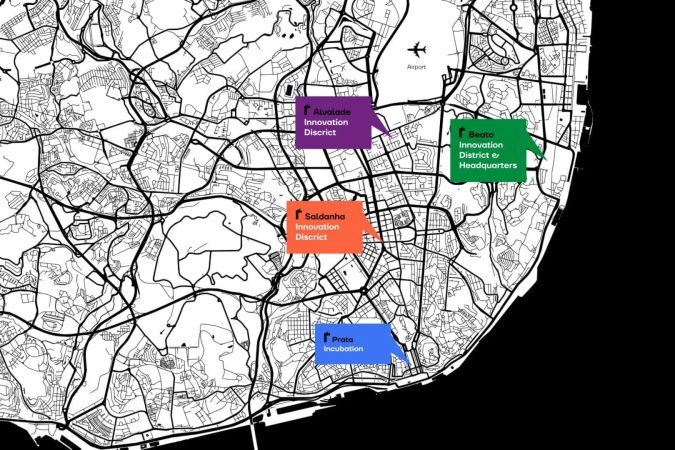
Caption: A map showing Lisbon’s four Innovation Districts. Graphic courtesy of Unicorn Factory Lisboa.
The leadership team at Unicorn Factory oversees each hub with a dedicated director, each of whom meet together routinely to synchronize their efforts. Building synergies across industries and sub-verticals — ranging from big data to biotech, robotics and virtual reality — allows for new startups in Lisbon to be guided to the most appropriate hub to receive integrated and tailored support. This robust ecosystem combined with a deep talent pipeline provides Lisbon with an edge in attracting foreign investment and creates local, high-skilled employment opportunities.
Addressing Urgent Needs in Lisbon’s Housing Market
The growth of Lisbon as a global destination for investors and tourists alike has led to a sharp rise in housing costs, making it one of the most expensive cities in the EU to call home. According to Idealista, rents in Lisbon over the past decade have doubled, and much like other European cities, including Barcelona and London, Lisbon is facing an intractable housing crisis.
On any given night, around 600 people sleep on the streets of Lisbon. To provide this vulnerable population with access to housing — a right guaranteed by Article 65 of the Portuguese Constitution — Associação Crescer (a Portuguese non-profit organisation) adopted an innovative global model proven to move people experiencing homelessness into long-term housing. Housing First takes a unique approach by providing someone a safe and stable home at the onset, and then offering access to wraparound services provided by social workers, psychiatrists and medical staff to help a participant rebuild their lives. “This is a model where the house is provided always with the support of a 24 hour available technical team.” explained Diana Gaspar, a psychologist with Crescer during a housing solutions panel. “So the idea is to connect the person that is in the house with all the community and social and health structures of the support network.”
This evidence-based model has been successfully applied in countries across the world from Finland to the United States, with an average 80% housing stability rate — and in Portugal, 90% of participants never return to rough sleeping. To scale this proven solution, maze, a Lisbon-based impact investment firm, is creating a €40 million real estate investment fund that will apply to 200 additional homes spread across the Lisbon metropolitan area and grant them exclusively for 15 years to Housing First operators. By leveraging the power of impact investing, combined with contributions from the municipal government, this public-private model demonstrates that cities can reduce homelessness by scaling solutions that are proven to work. It’s this coordinated effort that provides practitioners with hope and a vision zero goal.
“We really think that it’s possible in our lifetime … in the city that we love, that there is one day that no one sleeps rough on the streets. … It’s not millions of people like in the US or one million people like in the UK. It’s, you know, hundreds of people. So it’s attainable,” says António Miguel, Founder and Managing Partner, maze.
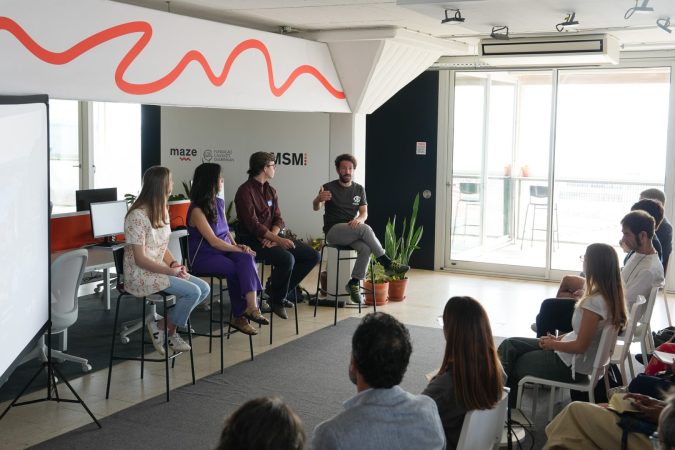
Caption: maze’s António Miguel speaks during a housing solutions panel at maze impact’s headquarters during Unicorn Week. From left to right: Mariana Carvalho, Fundraiser, Associação Crescer; Diana Gaspar, Psychologist, Crescer; Francisco Cardoso da Costa, Analyst, maze; António Miguel, Founder and Managing Partner, maze
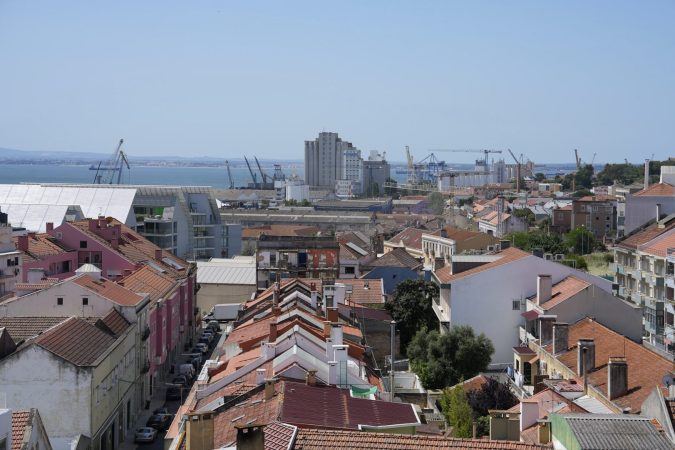
Caption: Overlooking the River Tagus and the Braço de Prata neighborhood westward towards Beato, Lisbon’s skyline bears the signs of urban regeneration and construction projects. Over the course of 25 years, the rent-controlled homes purchased through maze’s real estate fund could support between 200 and 1,000 people.
Bolstering Impact Investment and an Appetite for Growth
Innovative interventions like Housing First and UBBU show that with impact investment, solutions can be scaled to create even more impact. By cultivating an ecosystem that unites impact-driven actors across sectors, Lisbon is showing that it possesses the talent and infrastructure to take on even larger challenges. And where there’s challenge there’s also opportunity. “We understand that we have to do incredible work in Portugal, really set an example, and have more courage to have more market appetite, or ask for bigger tickets,” said Bárbara Leão de Carvalho, Impact Innovation Fund Director with 3xP Global at an impact investment event held at the Unicorn Factory in Beato.
Despite the challenges such as national-level bureaucracy, and the comparative size disadvantage with other global leaders in innovation like the US or China, Portugal possesses a formidable entrepreneurial spirit that will continue to power its innovation sector. “Portuguese entrepreneurs deliver more, with more quality, with more purpose and (with) much less,” shared Leão de Carvalho. “Culturally, we are used to doing a lot with very little. And this is an incredible advantage that we have.”
Miles Bullock is a US, Lisbon-based freelance writer and the owner of Vivid Atlantic. He has worked as a communications specialist in the social innovation sector for nearly 10 years.










